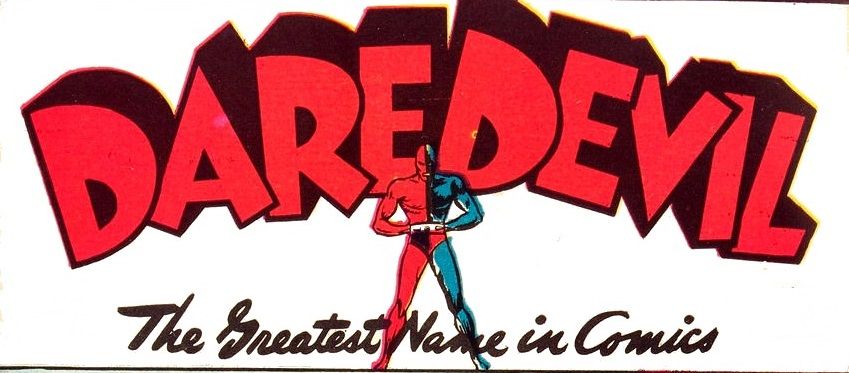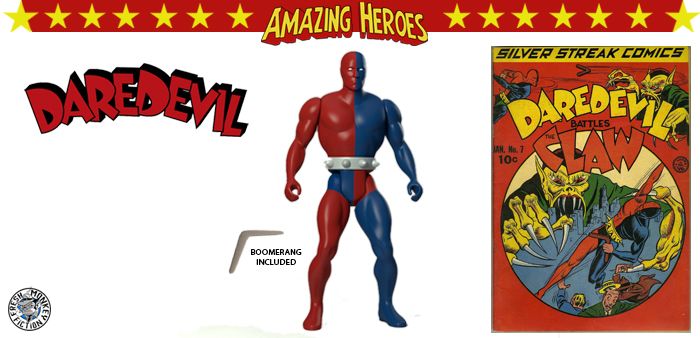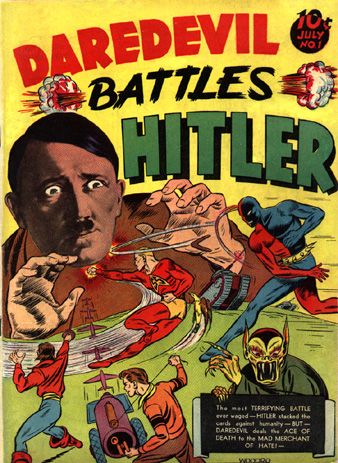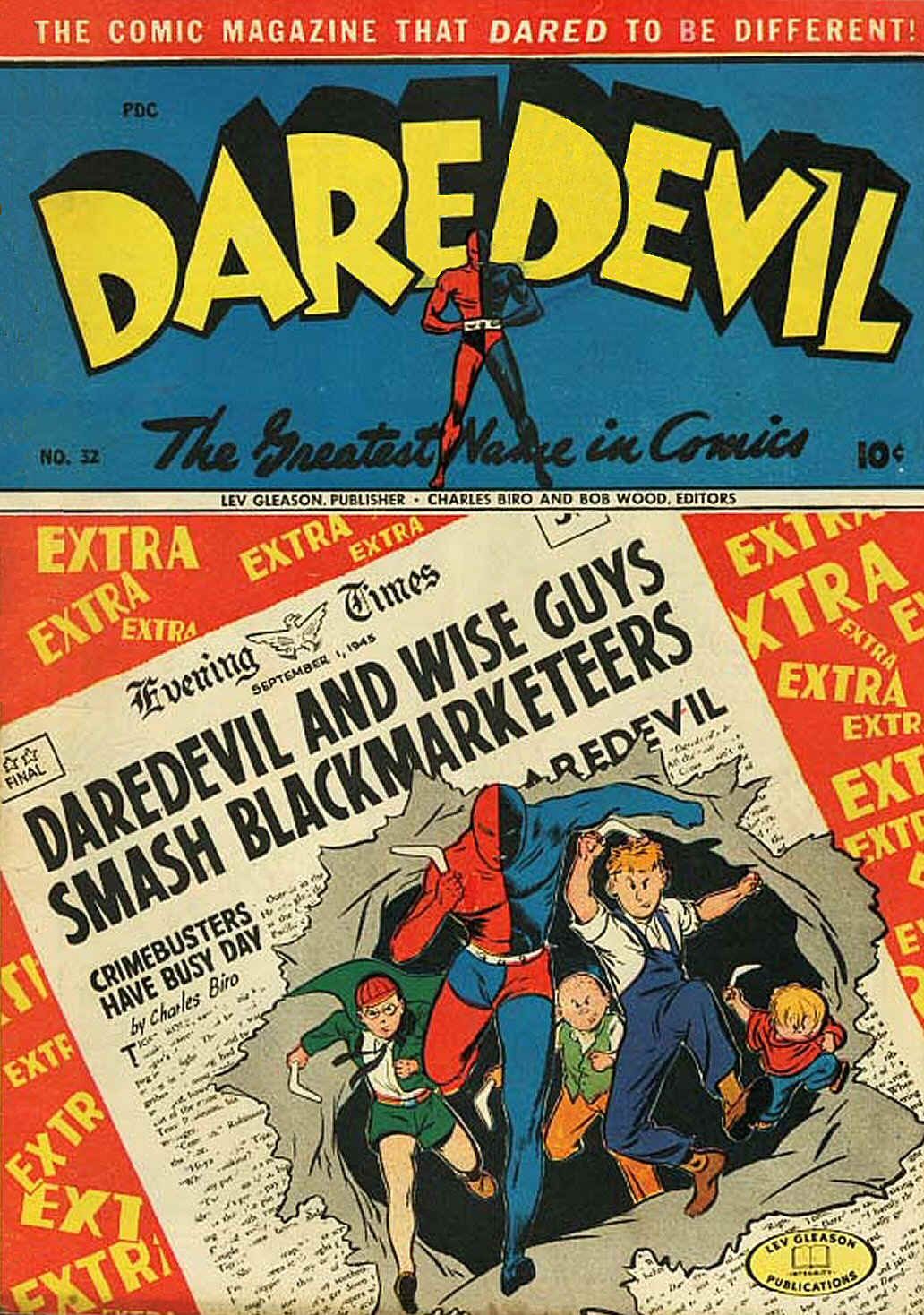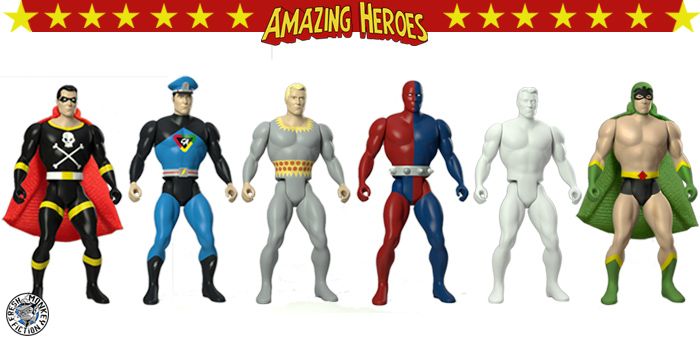This is the last in a series of essays on the classic characters that are being made into action figures via the Amazing Heroes Kickstarter campaign by Fresh Monkey Fiction. The figures are Stardust, Captain Action, Black Terror, the Golden Age Dare-Devil, Champion of Mars, and Silver Streak. Historian Christopher Irving (Leaping Tall Buildings: The Origins of American Comics and Graphic NYC) kicks it off with a look at Fletcher Hanks’ surreal hero Stardust the Super-Wizard. - BC
When Daredevil first fought crime—he was a man of no words.
It was eight pages in the back of 1940’s Silver Streak #6 by Lev Gleason Publications. Eight pages. It was an origin story that parallels Batman’s in the trauma department: while a young boy, Bart Hill is shocked into becoming a mute while witnessing his father’s murder by mobster and is then left with a boomerang-shaped scar on his chest. Using his scar as a sign, he trains himself on the boomerang and grows up to silently fight crime in his split yellow and blue costume. A spiked belt and “DD” mirrored across his abdominals completes the look.
Cartoonist Jack Binder’s original vision of this back-up crimefighter didn’t last long, however—editor Jack Cole took the boomerang-wielding hero and changed him in time to fight the title’s leading badguy—the monstrous Claw.
Jack Cole was a genius. Pure and simple. Even though he won’t create his signature character Plastic Man for another year, Cole has already accomplished his trademark style of superhero action mixed with screwball humor. Panels in Cole comics were packed with sight gags, exaggerated characters, flawless design and visual wit. His drawing may have been stiff in those early days of his career, but his humor and originality was already there and in full force.
When The Claw decides to take over the world, starting with New York City, playboy Bart Hill—now a talker and wearing red and blue in his superhero guise—takes on the towering Fu Manchu monster in a titanic and ridiculous story that runs five straight issues. By story’s end, Daredevil doesn’t just beat Claw, but also takes the top dog spot from his archfoe. Writer Don Rico takes over in the final part and sticks with DD for several more Silver Streak issues.
Daredevil launched his own book with Daredevil Battles Hitler in 1941.
Publisher Lev Gleason stumbled on a chance for a windfall of paper, but couldn’t procure a distributor’s advance until he had something to print it on. This was on a Friday…and he had until Monday to produce 64 pages worth of comic book to print on it.
Charlie Biro was a comics packager, an entrepreneur like Will Eisner and Jerry Iger, assembling the talent to crank out comics for the nearest bidder (or, in cases like these: publisher). Biro also happened to share a studio with artists Jerry Robinson and Bob Wood. Bringing in Jerry’s roommates Mort Meskin and Bernard Klein, as well as Bob’s brothers Dick and Dave, the small group faced the challenge of marathonning out the full comic. It was a Biblical feat that was, ironically, met with weather of Biblical proportions.
New York was unexpectedly hit that weekend by a blizzard that dumped five feet of snow and crippling New York City. Eventually, Klein picked the short straw and was sent out for food, coming back hours later with raw eggs and little else. The artists pried bathroom tiles off the wall and used them as makeshift hotplates to cook on.
It is a story of legend that defines the craziness of the comic book industry in those early days—an industry that churned work out at an alarming rate and sometimes produced unexpectedly genius results.
Biro will take Daredevil over, giving him a new origin in #18 that involves Hill’s being raised and trained by Aborigines while an orphan, and will remain his guiding creative light for sixteen years. The creation of a kid gang of sidekicks for Daredevil, the Little Wise Guys, would ultimately prove Daredevil’s downfall; kid gangs had become all the rage, what with Simon and Kirby’s Newsboy Legion and Boy Commandoes. Daredevil will remain a formidable crimefighter—and comic book—but it would never parallel the weirdness of those early days with Jack Cole.
The Little Wise guys eventually took the comic book over from Daredevil in 1950, holding on to the title until it folded in 1956.
Daredevil is just one of the Golden Age heroes that is part of the Fresh Monkey Fiction Amazing Heroes action figure line, up for crowdfunding on Kickstarter now. Donate now to bring Daredevil closer to coming to plastic action figure life for the first time ever.

